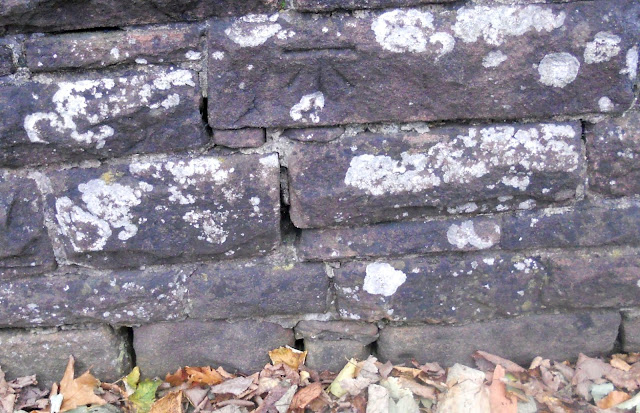The horizontal line is precisely 133.4707 metres above mean sea level, as measured from a datum in Liverpool.
I knew of only one other mark, on the Beacon Tower overlooking the town, which is one of four grade I listed buildings in town. Technically, this is not a benchmark but a ‘bolt’ (the hole where the lines join contains a recessed metal bolt, although I have no ideas about its purpose).
The tower was built in 1719 to house the fires that had been lit on the top of Beacon Pike for centuries to warn the local population that yet another Scottish raiding party was on its way. When I was growing up, the tower was surrounded by steel railings, but when I came back to live in Penrith in 1989, I was surprised to find not only that the railings had been removed but also that the door was not locked. I was even more surprised to discover that there was a spiral staircase in the left-hand corner in the view above. The raised horizontal masonry course coincides with the upper floor, which is where the fires would have been lit, turning the tower into a gigantic lantern. The door is now locked, apparently in response to serious vandalism.
Anyway, I wondered if I could find any more benchmarks. I didn’t have much luck, but I did find two on Beacon Edge, the highest road in town. This is the entrance to Caroline Cottage, which was once the entrance to the public-access land surrounding the Beacon Tower:
I decided to try a Google search for ‘Penrith benchmarks’, and top of the search was a website that styled itself ‘Bench Mark Database’ (BMD). The members of this website log visits to benchmarks, and it so happened that one such member had been visiting Penrith benchmarks only two days earlier, which is why the site appeared at the top of my Google search. When I tried the same search the following day, the site was nowhere to be seen, but I found it again by consulting my recent browsing history, and by searching within the BMD website I was able to obtain a list of all benchmarks located within a 50km radius of my postcode. From this list, I learned that there were once no fewer than 87 benchmarks in town—this total includes ‘bolts’, ‘rivets’, ‘pivots’ and ‘flush brackets’—although 24 have been logged as ‘destroyed’.
I had expected that such benchmarks would be located where there was a good line of sight to the next one—hence my decision to look for examples on Beacon Edge—but when I obtained the list, I noticed immediately that several were in the town centre, and I’d probably walked past them many times without noticing them. Here are five such examples:
The Lowther Arms, Queen Street
Last Orders, Burrowgate
The former Old Crown, King Street
Sidney Bakewell’s old shop, Stricklandgate
Birtle’s Sports shop in Cornmarket
All these benchmarks have been painted over, which makes them harder to spot but still clearly identifiable.
I also expected benchmarks to be carved on buildings or substantial pieces of stone such as gateposts, so when I returned to Beacon Edge to check out Nandana, the former youth hostel, I couldn’t find the mark because I examined only the gateposts at the entrance to the house’s grounds. I returned after consulting the BMD website and found the mark cut into a boundary wall:
There is a benchmark that is even harder to spot on Bridge Lane, the main road out of town to the south:
This one is so inconspicuous that, having crossed the road to take a general picture of the location, I had trouble relocating the mark.
Finally, here are three benchmarks that I’ve walked past dozens of times this year alone without noticing them. The first part of my morning walk takes me through Thacka Beck Nature Reserve, on the northwestern outskirts of town, as far as Thacka Lane. The railway bridge over this road has a benchmark carved into the right-hand abutment (the approximate location is shown by the red arrow), and the second photo is a close-up of the mark:
The second example is carved into a converted barn at the top of the hill leading away from the far side of the bridge. The benchmark is located between the door and the drainpipe).
Both photos were taken looking back the way I’d just come to avoid shooting into the sun.
Although I usually continue straight ahead past Arthur Terrace, I do occasionally turn right down Hunter Lane at this point, meaning that I walked past yet another benchmark without noticing it. The large sandstone building is the police station, built in 1904, and Sidney Bakewell’s shop (see above) can be seen at the end of the road.
I’ve now located 53 benchmarks in Penrith, although as far as I’m concerned that is the end of the story. Nevertheless, it has been an interesting exercise that I feel was worth the time and effort involved.




























A most impressive collection. Have you tried contacting a local history group on the subject?
ReplyDeleteNo I haven’t Peter. That’s an angle I hadn’t thought of. I did make some interesting deductions though. For example, there are five benchmarks on Graham Street, but none in either Wordsworth Street or Lowther Street, from which I conclude that Graham Street was built first.
DeleteSurprise, surprise that there ARE so MANY around Penrith!!!!!
ReplyDeleteI’ll show you next year!!!
Delete